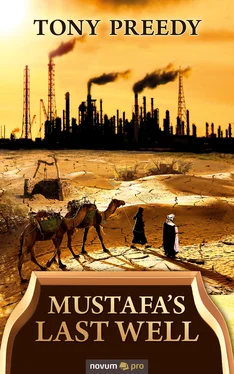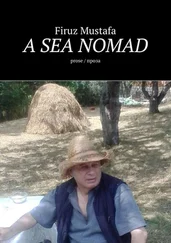***
Naamlah’s traders, who travelled through the desert to sell their pearls via the port of Salalah in the Hadramat, had long needed a source of drinking water to sustain them, for they could barely survive the journey with the quantity that their camels could carry. Mustafa had been commissioned by a consortium of traders to provide a well on the Naamlahn side of the mountains, where the trail ran close to the wadi. A price had been agreed and half payment had been accepted, with the balance due on completion. Preparations were made for the task by the boys, Hassan and Salim. They had now been with Mustafa for twelve years, during which they had matured into strong young men as a consequence of their healing, working on the farm and digging wells. Hassan thought that he might be 19 years old, which would make his brother 17, as there were two years between them. Hassan was cultivating a beard, which gave him an imperious appearance, belying his slave status. Salim was clean shaven and was taller than his older brother. Either could have overpowered Mustafa and run from his service, but they had remained dependent on him as they had no funds to sustain them if they did succeed in escaping. Besides, they had come to accept their status because they were devout Muslims, and did not the Holy Book tell of their social status as slaves?
Three camels were burdened by himself, the slaves, their food, bundles of straw, a tent, tools, and a generous ration of water. To the annoyance of the boys, their master insisted on accommodation being found for his hookah. After traveling south for five days, which took its toll on Mustafa’s health, their caravan had arrived at a depression in the wadi where gravel and rocks were visible among the sand and where, from his years of experience, Mustafa was confident of finding water. The boys were set to work erecting the tent in which their master would rest as soon as they had hobbled and unloaded the camels. By the time the camp was established, the sun was near the horizon. After ritual washing, as was dictated by their religion, using sand rather than precious water, it was time for all three to prostrate themselves towards Mecca in prayer before the sun disappeared. After their meal, the boys lay with the camels, whilst Mustafa retired to the tent, where he would attend to his journal and then relax smoking his hookah.
As dawn broke, after fajr prayers, Mustafa was summoned to eat with the boys, who had prepared milk from the camels and dates that they had harvested from Mustafa’s farm. Whilst cawah was brewing on the fire they had made of camel dung within a ring of stones, Mustafa collected his dousing equipment from the tent. He carried a bundle of short sisal rope ends over an arm and a Y-shaped dowsing stick in one hand. The dowsing stick was made from hazel, a wood imported from Europe and known for its favourable reaction to the “mystical” torsion waves/“dowsing fields.” Before the sun was high, he marched, puffing and panting, back and forth with the stick held before him until a field was detected and transmitted to his arthritic fingers, causing the apex of the stick to dip. At this point, he dropped a piece of rope. He continued until another response was observed, and dropped another piece of rope. Eventually, when satisfied that he had formed a suitable line of rope pieces, he changed direction and repeated the process until he had two lines that crossed. The boys were ordered to dig at the intersection, even though whether they were in Naamlah or the adjacent land of Haqum would be debatable.
The boys shovelled sand all day, with breaks only for refreshment and prayer, whilst Mustafa rested and puffed in his tent. The routine continued on the second day, when the sand gave way to gravel, but no sign of water. Their working conditions improved as they descended into shade. That evening the gravel gave way to rock and progress slowed, as the boys picked and chiselled at the rock and carried the off cuts to the surface. At this point in their digging, Salim made a discovery that brought their work to a halt. He made sure that Mustafa was resting before showing to Hassan the dahab he had found. In his hand was a nugget, unmistakably of gold, which was the size and shape of a ripe fig, with three nodules on its surface. Spurred on by this discovery, the boys worked harder than ever.
“We must tell the master,” said Salim.
“No; he would not share the gold with us. It must be our secret,” replied Hassan, and that was what they agreed. As smaller pieces of gold continued to be liberated from the rock, they were hidden in the camel blanket in which they kept the dates. They knew Mustafa never looked in there. On the fourth day of excavation, they were past the gold-bearing rock, which had progressively been replaced by clay.
Mustafa was pleased with their progress and ordered them to make a separate pile for clay. As his mind was now deteriorating, he unnecessarily informed them because they had done it many times before: “Inshallah (if Allah wills it), the first water from the well will be added to clay to make bricks, reinforced with the straw we have brought on the camels.” The boys were now working about four meters below the surface and progress was slow, as they had to form steps in the rock to enable them to bring up the clay. Slowly, the clay beneath them became damp, and water started to flow into the hole to cover their feet. Mustafa was summoned and showed his delight by giving thanks to Allah, but not to his slaves. Mustafa made the oldest slave, Hassan, taste the water. After no adverse reaction, he offered water to the camels, who drank it rapidly.
That night the boys plotted to abandon their master and try to return to their homeland. It was, therefore, with feelings of guilt that they made plans to desert the man to whom they owed so much.
Now that they had resources their loyalty to Mustafa was of secondary importance. Neither of them could remember much from before their abduction. They had been taken by armed men from their family’s camp between Hargeisa and Berbera. After two days marching, whilst chained by their ankles, they arrived at the port of Berbera. From here they were taken by dhow to the Persian Gulf. They were not sure which direction to take, but they knew they must travel to the south. From what little he knew of geography, gained from listening to traders, Hassan said that they should aim for Al’Adan on the coast of Yemen and ask how to cross to Somaliland. Hassan added that he knew the dhows sailed from their old country to Al’Adan, and must return. Until now they had not had the means to escape, but now they were confident of buying passage by dhow across the Arabian Sea from Al’Adan to the port of Berbera in Somaliland. From there, they thought, it could only be a camel ride to Hargeisa, where they would search for their tribe.
The following day the boys were set to making bricks with which to reinforce the well above the rock level, and then to extend above the surface to enclose the well against drifting sand. As the bricks in the wall hardened in the sun, Mustafa prepared a map by which the traders, guided by stars, could find the new well. In his tent, whilst puffing contentedly on the hookah, Mustafa was anticipating breaking camp and starting the journey home that evening – tomorrow in the old Arabic calendar, in which the new day started at sunset – but the boys outside were already preparing to abandon him. Two of the camels were laden with food and well water, but the blanket that concealed their find was heavy and could only be placed on the camel whilst she was sitting. Getting her on to her feet took much effort from both boys, because her burden now was more than she was used to carrying. Whilst loading the camels in haste, Salim had dropped the large nugget in the sand, but before he could recover it one of the camels kicked it away into the distance. It was abandoned, because Hassan would not wait whilst Salim searched for it by moonlight.
Читать дальше












